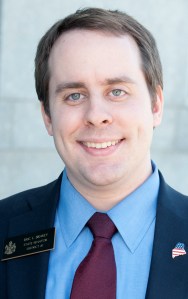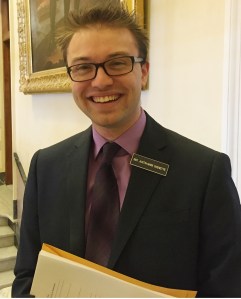AUGUSTA — A bipartisan group of state lawmakers continues to hone its focus on reforming the Maine Clean Election Act in an effort to keep those running for state office from forming and managing political action committees.
The system is ripe for corruption and fraught with ethical pitfalls because candidates accept donations for their leadership PACs from individuals, private businesses and even industry lobbyists, according to lawmakers seeking the reforms.
The Legislature’s Veterans and Legal Affairs Committee on Tuesday heard two bills looking to outlaw the practice of lawmakers forming so-called “leadership PACs,” which some have described as a “glaring loophole” in a law that was aimed at limiting the influence of money in state politics.
State Sen. Eric Brakey, R-Auburn, said his bill, LD 532, would prohibit those who accept clean election funds from forming PACs that in recent years have collected millions of dollars from private donors and corporate interests for campaigns.
“Something is terribly broken with the Maine clean elections system,” Brakey told the committee.
He said in 2014, one state senator, whom Brakey didn’t name but campaign finance records show is state Sen. Justin Alfond, D-Portland, signed up to be a clean election candidate and collected $20,000 in state funds for his campaign, and then operated a leadership PAC that collected more than $205,000 in private donations.
State law prohibits candidates who accept clean election funds from also collecting private donations for their own campaigns, but it doesn’t prevent them from operating PACs to raise money for other PACs or a political party’s PAC, which in turn spends the money in support of, or in opposition to, other candidates.
Often, candidates such as Alfond, deemed to be in so-called “safe districts,” where they do not face competitive races, or those in key leadership positions in the Legislature, set up the PACs to help their parties win seats and power. Donors to the PACs include individuals, companies, trade associations and often even the lobbyists who work for them, campaign finance records show.
The donors to Alfond’s PAC in 2014 included Walmart; Poland Spring’s parent company, Nestle Waters; the Maine Brewers’ Guild; Anheuser Busch; and the Law Offices of Joe Bornstein.
“If a candidate claims to be a clean candidate taking taxpayer money to be uninfluenced by the donations of private interests, should that candidate actually be prohibited from receiving private-interest dollars?” Brakey asked.
He said his bill prohibits publicly funded candidates from being the primary officers or decision-makers of PACs.
While it may be difficult to prove any direct connections between donations and policy decisions or votes, the practice doesn’t pass the “straight-face test,” Brakey said.
“There are many other purposes for this money, which violates the intent of the (clean election) law,” Brakey said. “There’s also nothing stopping candidates from donating PAC money to other groups, including political parties with a wink and a nod about where that money should be spent. Perhaps it should be spent on their own race?”
Compounding the problem is the migration of legislative caucus staff members, many of whom leave their State House jobs during the campaign season to work for the party or a party committee on campaigns.
For example, campaign finance records for 2014 show Alfond donated much of the money that his Alfond Business, Community and Democracy PAC raised to the Senate Democratic Campaign Committee, another PAC of which Alfond was also an officer.
That second PAC either spent money in support of Democratic candidates or in opposition to Republican candidates or in other cases passed the money on to yet another PAC run by the party, the Maine Democratic State Committee.
Alfond on Tuesday defended the practice, saying it isn’t illegal under Maine law. He suggested it was actually a more transparent way to raise campaign funds because the public can trace where the PAC money originates and which lawmaker was responsible for collecting the donations.
Brakey’s proposal and another, LD 619, offered by state Rep. Justin Chenette, D-Saco, that outlaws PACs for any candidate running for the Legislature, regardless of whether they take public funding or are traditionally financed with private donations, actually decrease transparency in the system because donors would simply give straight to party PACs with no indication of whom asked for the donation in the first place.
“People in my position, going forward, will continue to raise money into the caucus operations, and you will have no idea how much money they raise, where it comes from or how to track any of it; it will be all underground,” Alfond said. “You will have no idea how to track any money in the state of Maine, other than how the Democratic Party or the Republican Party or the caucus operations spend the money. You will have no idea how it gets inputted.”
Alfond said that who gave money and how money is spent by PACs would still be available in campaign finance disclosures, but there would be no indication of which lawmaker was responsible, and no way to match any legislative actions to the donations in question.
“I have Republicans that give to me, I have Democrats that give to me, I have unenrolleds that give to me and most of the money is coming from within the state of Maine because people want our state to move in a certain direction, the direction they see me and my colleagues moving it,” Alfond said. “It’s a completely transparent process. I report every (fiscal) quarter everyone who gives to me, and I think it is a pretty solid system.”
Alfond said if the Legislature were to change the system, he and others would abide by the change, but without first reviewing both bills, he would not say whether he would support the measures.
But Chenette, the Saco Democrat, pointed to the case of former state Sen. John Tuttle, a Democrat from Sanford who ran a PAC that collected donations from entities subject to the jurisdiction of the committee he co-chaired, Veterans and Legal Affairs — which also has jurisdiction over campaign finance law — to show how ripe Maine’s system is for corruption.
An October 2014 investigation by the nonprofit Maine Center for Public Interest Reporting revealed Tuttle used at least $17,000 from his PAC to buy automobile tires, pay for car repairs, reimburse himself for travel and to pay his wife and daughter for computer services and keeping his books.
The report also disclosed that many of Tuttle’s PAC donations came from gambling and liquor industry lobbyists or companies, most of which were working for or against legislation before Tuttle’s committee.
“This is precisely the kind of perception problem I am seeking to avoid,” Chenette told the Veterans and Legal Affairs Committee on Monday. “Imagine having to decide public policy … on this committee through a cloud of political contributions from the very industries you are supposed to be regulating.”
While none of Tuttle’s actions were illegal under Maine law, his practices did raise eyebrows and concerns about the way lawmakers use and disburse money from the PACs they create. After serving 28 years in the Legislature, Tuttle lost his re-election bid in 2014 to Robert Woodsome, a Waterboro Republican who won nearly 60 percent of the vote.
Chenette said even if a lawmaker’s voting record doesn’t indicate bias toward the entities that donate to his or her PAC, the perception remains.
“Your constituents deserve to know without a shadow of a doubt that you have their interests at heart and not the interests of the lobbyist with the largest checkbook,” Chenette said. “Our government should set the example, not be the ones the public looks down upon with utter disgust because of the way we are conducting business behind the scenes.”
John Brautigam, a former state lawmaker and a lawyer who works with Maine Citizens for Clean Elections, said his organization supports the bills being offered by both Brakey and Chenette, although it favors Chenette’s bill more.
Brautigam said he believes allowing candidates to support their respective caucus PACs without having their own PACs is a more simple and transparent system.
“You can participate in campaigns in a variety of ways,” he said. Also, privately financed candidates are already allowed under state law to spend their funds in support of other candidates and that wouldn’t change under either bill.
He said that process involves plenty of reporting and involves contribution limits for donors that fit in with the campaign finance laws Maine already has on the books.
Committee member John Bear, a nonvoting tribal representative for the Houlton Band of Maliseet Indians, asked Brautigam if the bills were basically an attempt at “speaking truth to power.”
“I definitely agree with that,” Brautigam said. “I think, sometimes, people who are in power came from a place where they are very familiar with what the day-to-day truth was and they kind of get to a different place and a little reminder is a very helpful thing to do.”
No opposition to either bill was presented to the committee Monday.
The committee will continue to review the bills in an upcoming work session. The measures could be folded into one bill or amended before the committee votes on a recommendation for the full Legislature.


Comments are no longer available on this story